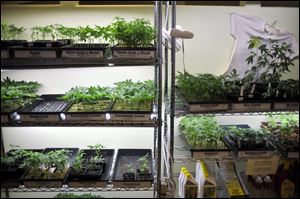
Panel greenlights proposed rules for Ohio’s medical marijuana
8/1/2017
In this Wednesday, June 28, 2017, photo, marijuana plants grow at the Desert Grown Farms cultivation facility in Las Vegas.
ASSOCIATED PRESS

This Oct. 29, 2009, file photo shows trays of marijuana clones and gardening supplies underneath grow lights at the Peace in Medicine dispensary in Sebastopol, Calif.
COLUMBUS — Those who will process, test, sell, use and administer medical cannabis as part of Ohio’s newly legal program saw most of the rules under which they will operate fall into place Monday.
A bipartisan legislative panel opted not to interfere with more than 100 separate rules proposed by the Ohio Pharmacy Board and state Department of Commerce. The rules write between the lines of the state law passed last year that legalized marijuana for medical use only.
They tell patients suffering from certain diseases or conditions and their caregivers how they can acquire state cards to participate, what types of cannabis they may buy, and how they may use it, and prohibit processors and retail dispensaries from making or selling products that might look attractive to children.
They limit the number and location of processors and dispensaries, govern who can and cannot get into Ohio’s new pot industry, and dictate how to dispose of excess supply.
The 10-member Joint Committee on Agency Rule Review, consisting of three Republicans and two Democrats each from the House and Senate, could not change the rules, but it could have delayed them for additional review.
Its jurisdiction was largely limited to whether the rules conflicted with state law or other rules or whether they overstepped the proposing agency’s authority.
Renea Murnahan Turner, owner of Cannabis for Cures in Springfield, argued that the scoring system when it comes to licenses for various proposed marijuana businesses work against Ohioans because they give points to applicants with experience in the field legally.
“Anyone who lives here doesn’t have that experience...,” she said. “It’s still an unrealistic scale that is actually not for the better of Ohioans.”
But Sen. Bob Hackett (R., London), a joint committee member, said giving credit for experience makes sense.
“Actually, in my county, the No. 1 corporations are Japanese-owned corporations …,” he said. “They bring in a few people with the expertise, etc., and they hire just hundreds and hundreds of people. It’s not like they’re bringing in all the workers. …
“That’s the American way,” Mr. Hackett said. “We do that all the time.”
Some who plan to apply for licenses as cultivators, processors and retailers have partnered with or hired consultants with experience in states such as Colorado, Washington and Oregon, where marijuana sales in some fashion has been legalized.
The agencies face a Sept. 1 deadline for all rules to be finalized.
The state already has approved the rules under which 24 growing facilities will operate, and they are expected to be licensed next month in order to have Ohio-grown product in place by the time processors, laboratories, and dispensaries begin operation.
Ohio’s program must be fully operational by Sept. 1, 2018, with patients or their caregivers able to buy cannabis in approved form — oils, tinctures, patches, edibles, and plant matter. House Bill 523, the law legalizing medical marijuana, prohibits smoking, but cannabis may be administered as a vapor.
The law also prohibits the home growing of marijuana. Every product must be obtained through a licensed dispensary as part of a system in which product would be tracked by the state at every step in the supply chain, from seed to sale.
Lawmakers could revisit the rules for testing. House Bill 523 initially limited participation to public universities, but the schools’ concerns about endangering their federal funding means they haven’t been eager to sign on.
The pharmacy board continues to discuss generally where the 60 retail dispensaries it will license may be located. The board is accepting public comment on a proposed map it unveiled last week that suggests how they would be distributed.
The entire 24-county northwest quadrant would get 10, including two in Lucas County.
Contact Jim Provance at jprovance@theblade.com or 614-221-0496.